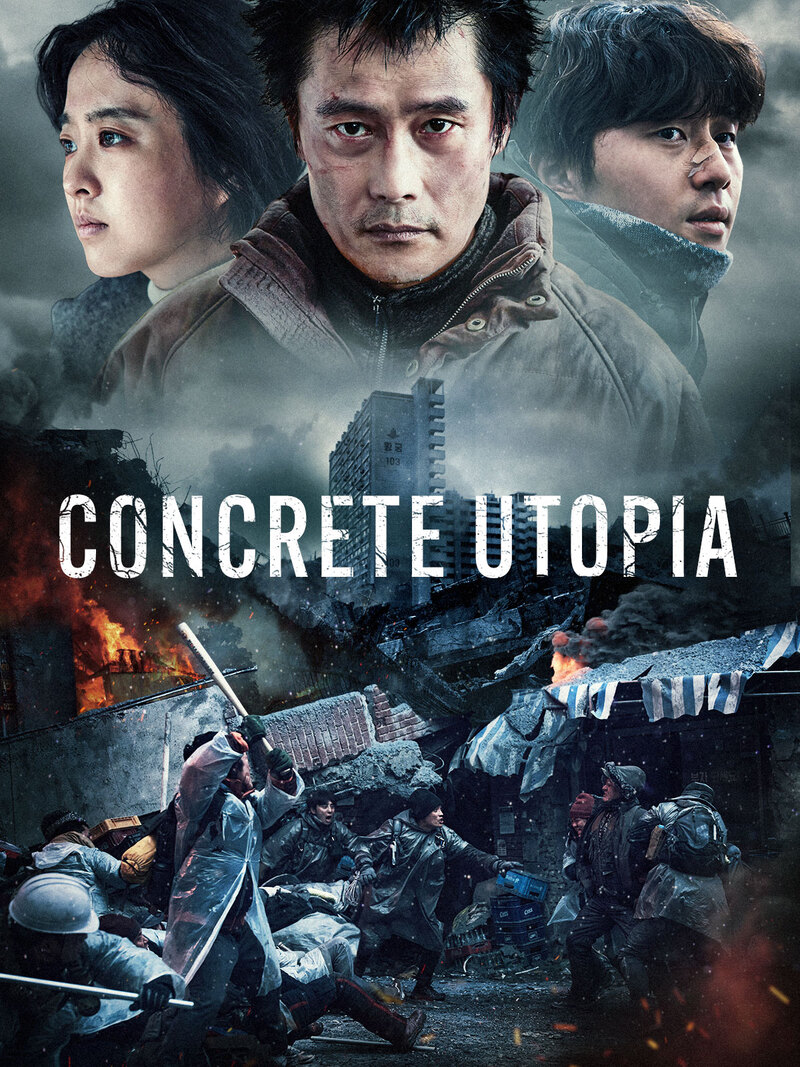
When Seoul is destroyed by an earthquake, tensions rise around the city's
one surviving apartment block.
Review by
Eric Hillis
Directed by: Um Tae-hwa
Starring: Lee Byung-hun, Park Seo-joon, Park Bo-young, Kim Sun-young, Park Ji-hu, Kim Do-yoon

In Europe it's generally recognised that the post-war social experiment of
packing people into high rise apartment buildings was a failure. Many of the
continent's most notorious tower blocks have been torn down, but plenty
still remain, generally housing those on the lowest rungs of society. In
many parts of the world tower blocks are still viewed as utopian rather than
dystopian constructs. Concrete Utopia, South Korea's submission to the 2024 Oscars, opens with a montage that
details that nation's relationship with high rise apartment blocks. In Korea
it seems they're still aspirational, with citizens taking part in lotteries
in the hopes of acquiring a much sought after home in the heavens.
Director Um Tae-hwa's film, adapted from a popular web comic,
suggests that Korea may be reassessing its view of tower blocks. Like JG
Ballard's
High Rise, Cronenberg's Shivers and recent European dystopian
dramas The Antenna
and
We Might As Well Be Dead, Concrete Utopia employs a tower block as a microcosm of
society, exploring how easily its foundations can crumble under
stress.

Like We Might As Well Be Dead, Concrete Utopia takes place in the aftermath of a
catastrophe with survivors huddling together in the one apartment block left
standing. Here it's a massive earthquake that has turned Seoul, and
presumably much of the surrounding world, to rubble. Save that is for the
Imperial Palace Apartments, which miraculously remains untouched. Initially
it's a haven for survivors, but as resources become stretched the residents
of the Imperial Palace decide they can only look out for themselves.
Hailed as a hero for putting out a fire, Yeong-tak (Lee Byung-hun) is viewed as a man with the sort of initiative and leadership qualities
to keep the tower safe from outsiders (who become known as "cockroaches").
He's elected to the role of "Delegate," and it doesn't take long for this
unassuming man to embrace his new role as a dictator. Taken under his wing
is Min-seong (Park Seo-joon), whose wife, Myeong-hwa (Park Bo-young), grows increasingly uncomfortable with the coldness taking over her
husband and her neighbours' descent into fascism.

There's very little material here that hasn't already been covered in the
aforementioned movies with which Concrete Utopia shares its
basic premise. With the surrounding area in ruins there are many aspects
that are familiar from the Hollywood disaster movies of the 1970s, where
society descends into chaos and only a few heroic types step up to do what's
right. The difference here is that there are no heroes in this misanthropic
drama. Well, I guess that depends on your perspective. Yeong-tak and
Myeong-hwa certainly put their lives on the line in venturing out into the
devastated landscape in search of much needed resources, but with the film
acting as a blunt allegory for xenophobia it's impossible to view them in a
heroic light. Of course, it's easy for the audience to moralise from the comfort of our
still-standing cinema auditoriums or living rooms.
Concrete Utopia forces us to ponder how we might deal with
such a scenario. Would we risk our own family's lives to help
strangers?
The moral ambiguity is lifted somewhat by a third act revelation that
exposes the true villainy of a particular character. Kim Do-yoon enters the film as Do-gyun, a teenage girl who once
resided in the building and is immediately accepted into the fold (a touch
which strengthens any reading of Concrete Utopia as an
allegory for Israel). But Do-gyun knows a secret that threatens to topple
the established order, and the film takes on an intriguing sub-plot that
really should have been introduced a lot earlier.

At two hours and 10 minutes, there are stretches of
Concrete Utopia that drag due to their familiarity. It often
feels like we're simply watching plot beats rehashed from dozens of
existing post-apocalyptic, disaster and zombie movies. It's the presence
of the outstanding Byung-hun that gets us through such patches. Resembling
a Korean Mads Mikkelsen, he possesses the sort of face that can switch
from vulnerability to malevolence in an instant, and his evolution from
everyman to autocrat is the concrete and steel that holds this allegorical
tale together.

Concrete Utopia is on UK/ROI VOD
from April 1st.
